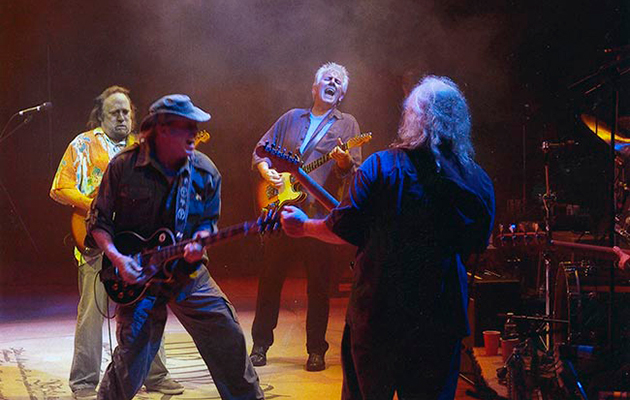For Dallas Taylor, the rot really set in during those sessions.
“Money started to become an issue,” he says. Taylor was not enamoured with David Geffen, who was managing the band alongside Elliot Roberts and doing deals that allowed them to indulge their less idealistic whims. “Geffen was a tough businessman,” Taylor says. “He never did anything for me, that’s for sure. He took my 20 per cent, and never helped my career at all. He was not a nice human being.”
Clearly, Taylor’s bitterness at being edged out of the group has not waned over the years.
“It happened during the Déjà Vu tour, where Neil slammed his guitar down on the stage and stomped off. He wanted to continue the tour with the three of them and me. He wanted to fire Stills, and I sided with Stills, and that was my biggest mistake. So the way I understand it, it was ‘Dallas goes or Stills goes, one or the other.’”
For Graham Nash the disintegration of CSNY at this point mirrored the drift into dissolution of the hippy dream he had witnessed on the streets of San Francisco’s Haight-Ashbury, where he’d lived since 1969.
“The Haight was a gathering point for energy, but it dragged in all the bad energy, too, all the heroin and all the major drugs and homeless people and people begging and looking for handouts and breaking into houses. It wasn’t pleasant. It was at one point, but then it turned nasty.
“When you start getting into really bad drugs, where you can put something into your arm and end up dead 30 seconds later, that’s the antithesis of what we really wanted to do, which was celebrate life and positive energy and moving forward. When George [Harrison] went there with his heart-shaped glasses, that was the beginning of the end of Haight-Ashbury.”
___________________
It was almost the end, too, for CSNY. Even as the multi-million-selling Déjà Vu made them briefly the biggest rock band on the planet, the irreconcilable divisions between them made it impossible for the band to continue. And when the Déjà Vu tour ended on July 9, it would be another four years until they appeared together again on the same stage.
There was one last hurrah, however – a single written in anger and outrage by Young about the shooting on May 4, 1970 by National Guardsmen of four students on the campus of Ohio’s Kent State University.
“Life jumps up and smacks us in the face sometimes with something that we have to write about,” says Crosby of perhaps the band’s greatest song. “That’s how ‘Ohio’ happened. Neil and I were at a friend’s house in California and the friend brought home that copy of LIFE magazine [shown below], with a girl kneeling over the kid, with that ‘Why?’ expression on her face, and he looked at the picture for a while, and he picked up his guitar and he started writing ‘Ohio’. When he finished, I called Nash and said, ‘Get a studio right now!’ We cut it and gave it to Ahmet Ertegun and we had it out in about a week.”
CSNY already had a single out at the time, Nash’s far gentler “Teach Your Children”.
“It was headed for the top,” says Crosby. “And Nash pulled it so that ‘Ohio’ could go, which tells you what kind of guy Nash is.”
Nash, on the subject of “Ohio”, baulks at its apparent representation of Neil as CSNY’s radical conscience.
“It’s quite strange,” he says, “that Neil should be seen as a political animal. It was always Crosby, Stills and Nash that were doing all that other stuff.” Maybe he’s thinking of Neil – and Stills – refusing to take part in a benefit for the Chicago Seven anti-war protesters, celebrity radicals who’d been arrested at the 1968 Democratic Convention, which in turn inspired Nash’s heartfelt “Chicago”.
“‘Ohio’,” he now goes on, “that was not politics. That was a human tragedy. When you slaughter four students who are using their American, God-given right to protest the government, when they got slaughtered, that wasn’t politics, that was a human tragedy, and to this day no one has apologised to the families. So that wasn’t a political statement by Neil. That was anger at the death of four students.”
“We got fat and lazy, and we paid the price,” says Stephen Stills, looking back nigh on 40 years to a time when the world was there for CSNY’s taking. “There was a lot of drinking, just bad behaviour and mucking about. And then a few years later, when you get to this age, you start remembering some of the more embarrassing shit you did. And thank God, I’m past 60 now, because I can at least laugh at some of the things I did, instead of wanting to crawl into a hole.”



